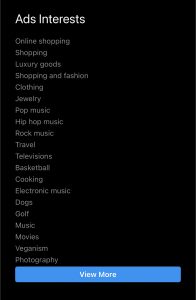Data, as a collection of information, seems to have an overarching observational impact on human experience, almost as though all our interactions with technology are being tracked. This tracking can create a sense of fear surrounding the use of technologies and media that employ these data collecting software. The collection of data can provide a seemingly infinite range of information to both the data collectors and viewers, however it is how this data is used that determines the morality of its collection. For example, Spotify recommending songs and artists to its users simply enhances the experience on the app without obtaining invasive information. In contrast, suddenly receiving advertisements on Instagram for a product mentioned in a conversation seems intrusive. Oftentimes we aren’t aware that we are being tracked, and when we are reminded of this, it makes us particularly uncomfortable. This prompted me to look into just what data Instagram is gathering about me. This Wired article explains some of the ways users can limit the data Instagram collects, through filtering, disabling, or even deleting one’s account. I’ve included an example of what Instagram has determined, through their data collection, to be my “Ads Interests”. I have no genuine interest in many of the things on this list, leading me to wonder what about my interactions with the app have led it to these conclusions.

my “Ads Interests” as determined by Instagram
https://www.wired.com/story/how-to-stop-instagram-from-tracking-everything-you-do/

Your personal example of the ads recommended to you is extremely interesting and scary. We constantly hear about us being tracked and joke about it, but are not truly confronted with it. Your visual with a complete list of all the ads recommended to you and what is being tracked by what you like and don’t like though seemingly innocent, is very scary to be confronted with. It has inspired me to look into what is being recorded on my own devices because after our discussion Tuesday, I am starting to notice what is constantly and perennially advertised to me.
I agree that the way in which data is used determines the morality of its collection. Like many other people, I’ve had countless experiences where I’ll have a conversation with someone about a certain product and then get instagram ads for that product for the next week. It is quite unsettling to think about our conversations being listened to and analyzed by Instagram or any other technology. I remember this being a phenomenon either one or two years ago, and once enough people started talking about it, Instagram issued a statement that they do not listen to conversations. However, when I disabled the microphone feature on Instagram, I immediately stopped getting ads based on conversations. It all seems like such an intrusion of privacy, though I’m beginning to realize that, if we want the benefits of technology, we need to tolerate the fact our personal data is compromised.